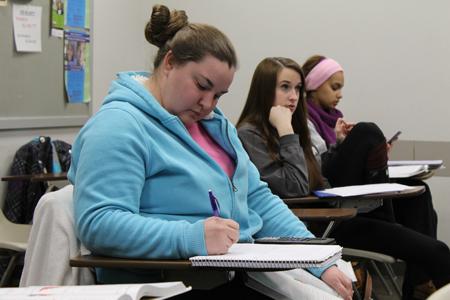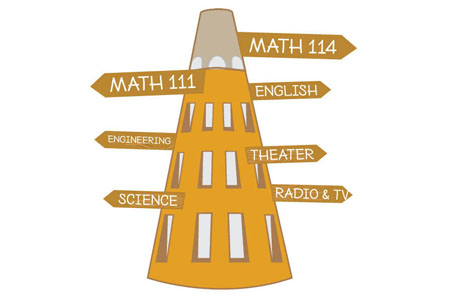MATH 111 has significantly impacted probation rates because of its high D, F, W (withdrawal) percentage.
Malana Boris chose to take MATH 114 instead of repeating MATH 111.
The sophomore radiology major took MATH 111 (College Algebra) her freshman year to fulfill the core requirement and received a C. She enrolled in MATH 114 (Quanititative Reasoning) to raise her GPA.
“I couldn’t learn the material the way my teacher expected me to,” Boris said. “So, I decided to retake the required math class for my core and replace my grade.”
The Fall 2014 D, F, W rates for MATH 114 fell below 30 percent, but rose from 43 to 57 percent for MATH 111, something that USI and consulting firm Noel-Levitz have identified as an issue that negatively impacts student retention.

Boris said that although she has only been in MATH 114 for a couple of weeks, she finds the class more enjoyable than MATH 111.
“I like MATH 114 because it is not straight up algebra problems and solving for x. Algebra has always been somewhat difficult for me,” Boris said.
She said the MATH 114 terms, definitions and logic are different than any class she’s taken.
“I do like (MATH 114) better because it is different and is something new,” Boris said.
She said, so far, she has learned things in the course that will apply to life “in eneral,” such as real world percentages, problems and situations that prepare her for future careers instead of spending time on “lengthy” equations she may never use again.
Although Boris said she does not feel like MATH 114 is pertinent for her major, she does feel that it will help her in the future.
“I feel like MATH 114 is more beneficial for my life in the future because I am very rarely going to have to sit down and figure out lengthy mathematical equations, defining x or irrational types of equations,” she said. “In my opinion, MATH 111 has unimportant math tasks that you only need to comprehend for the class period and study what you need to (know) for the tests.”
Chair (Acting) of Mathematics Department William Wilding said the idea to implement MATH 114 came about while discussing Core 39.
“Many majors at USI don’t benefit fully from their last math class being college algebra. College algebra is really a pathway to a calculus class,” Wilding said.
He said the Math Department wanted to create a more useful class. The quantitative reasoning course touches base on about five to six areas from probability to personal finance.
“Basically, the theme is areas that may be useful later in life for a student,” Wilding said.
Sophomore respiratory therapy major Benjamin Carney has taken previous math classes at other universities, but is now taking MATH 114.
Carney said MATH 111 is better for school in general, but MATH 114 is more beneficial for his life and future.
“MATH 114 has a lot of real life applications, but not a lot of school applications,” he said.
Carney said he thinks the course is necessary for his major and sees how, in general, it can be beneficial to all majors because it covers a variety of material.
“MATH 114 jumps around a lot and is all over the place, but covers a lot of material we will use later in life,” Carney said. “The class varies from logic to reasoning, data graphs to mortgages.”
Wilding said this rise in D, F, W rates occurred because of a change in the class’s population.
“There were more students that were actually repeating 111 than normally,” he said.
For example, students who had already taken 111 and failed to pass it chose to retake the course and replace their grade rather than take 114.
“There was a higher proportion of repeaters,” Wilding said. “Traditionally, someone repeating a course doesn’t get through at the same success level that someone who’s taking it for the first time does.”
Wilding said it is unlikely this trend in D, F, W rates will continue and that the classes will see a return to their normal success rate, or possibly even decrease.
The math department will need to gather several semester’s worth of data before determining the success of MATH 114, he said.
“We are imagining that in time at least we’re going to define majors that are better served by 114 and majors that are better served by 111,” Wilding said. “I think the introduction of quantitative reasoning will increase retention.”
Jeanette Burbage contributed to this story



